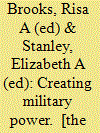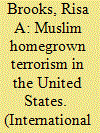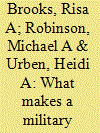|
|
|
Sort Order |
|
|
|
Items / Page
|
|
|
|
|
|
|
| Srl | Item |
| 1 |
ID:
089609


|
|
|
|
|
| Publication |
Stanford, Stanford University Press, 2007.
|
| Description |
ix, 252p.
|
| Standard Number |
9780804753999
|
|
|
|
|
|
|
|
|
|
|
|
Copies: C:1/I:0,R:0,Q:0
Circulation
| Accession# | Call# | Current Location | Status | Policy | Location |
| 054284 | 355.0332/BRO 054284 | Main | On Shelf | General | |
|
|
|
|
| 2 |
ID:
107648


|
|
|
|
|
| Publication |
2011.
|
| Summary/Abstract |
Since the September 11 attacks, analysts and public officials have expressed growing concern about the potential of Muslim citizens and residents of the United States to plot attacks within the country's borders-a phenomenon sometimes referred to as "homegrown" terrorism. To assess this apparent threat, it is necessary to examine what is known about the willingness and capacity of Muslim Americans to execute deadly attacks in the United States. Three conditions, either alone or together, could contribute to an increasing threat of homegrown terrorism. The first concerns what is known about the radicalization of Muslim Americans and whether a surge in arrests in 2009 indicates a growing trend in Muslim American terrorism. The second relates to the capacity of aspiring militants to avoid detection as they prepare attacks. The third depends on the skills of aspiring terrorists and therefore their capacities to execute increasingly sophisticated attacks. The analysis should be generally reassuring to those concerned about Muslim homegrown terrorism. On both analytical and empirical grounds, there is not a significant basis for anticipating that Muslim Americans are increasingly motivated or capable of successfully engaging in lethal terrorist attacks in the United States.
|
|
|
|
|
|
|
|
|
|
|
|
|
|
|
|
| 3 |
ID:
123663


|
|
|
|
|
| Publication |
2013.
|
| Summary/Abstract |
This article seeks to answer several vital questions about contemporary American civil- military relations. For example, why might the most professional military in United States history seem to be especially likely to engage in public dissent and advocacy? Why might political dissent and activity hold appeal for current and upcoming generations of military officers? And, how can present day officers be persuaded that retaining an apolitical ethos is fundamental to the American military, not just because of tradition but because public dissent can do real damage to the military institution and to the country it serves?
|
|
|
|
|
|
|
|
|
|
|
|
|
|
|
|
| 4 |
ID:
055288


|
|
|
| 5 |
ID:
083507


|
|
|
|
|
| Publication |
Princeton, Princeton University Press, 2008.
|
| Description |
315p.
|
| Standard Number |
9780691136684
|
|
|
|
|
|
|
|
|
|
|
|
Copies: C:1/I:0,R:0,Q:0
Circulation
| Accession# | Call# | Current Location | Status | Policy | Location |
| 053922 | 355.02/BRO 053922 | Main | On Shelf | General | |
|
|
|
|
| 6 |
ID:
187105


|
|
|
|
|
| Summary/Abstract |
Scholars have contended that norms of professionalism are critical to understanding how militaries interact with civilian leaders and when they intervene in politics. Yet, few studies have directly examined the normative structures of military officers. Through a survey of 1468 US Military Academy cadets, this study evaluates cadets’ views toward professionalism, and in particular what is often presumed to be the dominant framework of those norms based on Samuel Huntington’s The Soldier and the State. We identify five patterns of normative beliefs based on cadets’ views of civil–military interaction and the nonpartisan ethic: orthodox, unorthodox, inconsistent, non-committal, and motivated norms. Cadets fall into each of these categories, but approximately one-quarter demonstrate motivated norms, adhering when convenient, and otherwise dispensing with them when the rules they prescribe clash with their partisan identities. These findings, especially our novel conceptualization on norm adherence, contribute to a greater understanding of military culture and professionalism.
|
|
|
|
|
|
|
|
|
|
|
|
|
|
|
|
|
|
|
|
|